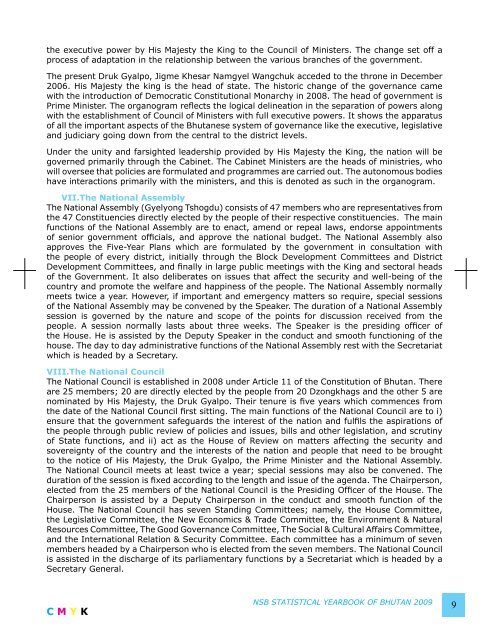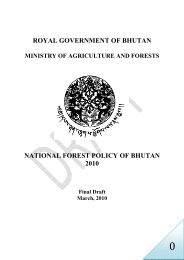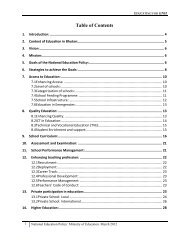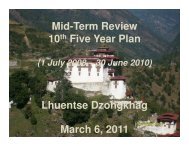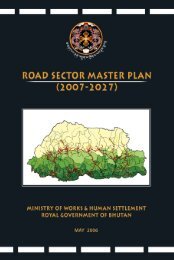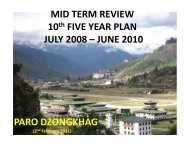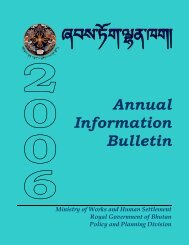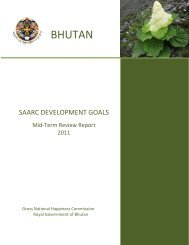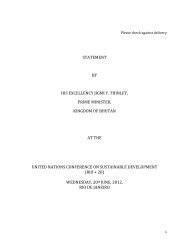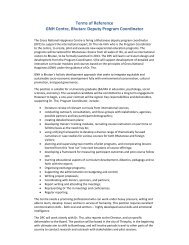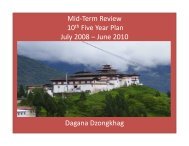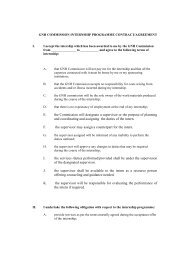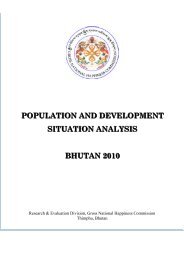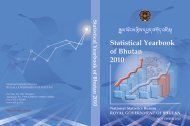National Statistics Bureau - Gross National Happiness Commission
National Statistics Bureau - Gross National Happiness Commission
National Statistics Bureau - Gross National Happiness Commission
You also want an ePaper? Increase the reach of your titles
YUMPU automatically turns print PDFs into web optimized ePapers that Google loves.
the executive power by His Majesty the King to the Council of Ministers. The change set off a<br />
process of adaptation in the relationship between the various branches of the government.<br />
The present Druk Gyalpo, Jigme Khesar Namgyel Wangchuk acceded to the throne in December<br />
2006. His Majesty the king is the head of state. The historic change of the governance came<br />
with the introduction of Democratic Constitutional Monarchy in 2008. The head of government is<br />
Prime Minister. The organogram reflects the logical delineation in the separation of powers along<br />
with the establishment of Council of Ministers with full executive powers. It shows the apparatus<br />
of all the important aspects of the Bhutanese system of governance like the executive, legislative<br />
and judiciary going down from the central to the district levels.<br />
Under the unity and farsighted leadership provided by His Majesty the King, the nation will be<br />
governed primarily through the Cabinet. The Cabinet Ministers are the heads of ministries, who<br />
will oversee that policies are formulated and programmes are carried out. The autonomous bodies<br />
have interactions primarily with the ministers, and this is denoted as such in the organogram.<br />
VII.The <strong>National</strong> Assembly<br />
The <strong>National</strong> Assembly (Gyelyong Tshogdu) consists of 47 members who are representatives from<br />
the 47 Constituencies directly elected by the people of their respective constituencies. The main<br />
functions of the <strong>National</strong> Assembly are to enact, amend or repeal laws, endorse appointments<br />
of senior government officials, and approve the national budget. The <strong>National</strong> Assembly also<br />
approves the Five-Year Plans which are formulated by the government in consultation with<br />
the people of every district, initially through the Block Development Committees and District<br />
Development Committees, and finally in large public meetings with the King and sectoral heads<br />
of the Government. It also deliberates on issues that affect the security and well-being of the<br />
country and promote the welfare and happiness of the people. The <strong>National</strong> Assembly normally<br />
meets twice a year. However, if important and emergency matters so require, special sessions<br />
of the <strong>National</strong> Assembly may be convened by the Speaker. The duration of a <strong>National</strong> Assembly<br />
session is governed by the nature and scope of the points for discussion received from the<br />
people. A session normally lasts about three weeks. The Speaker is the presiding officer of<br />
the House. He is assisted by the Deputy Speaker in the conduct and smooth functioning of the<br />
house. The day to day administrative functions of the <strong>National</strong> Assembly rest with the Secretariat<br />
which is headed by a Secretary.<br />
VIII.The <strong>National</strong> Council<br />
The <strong>National</strong> Council is established in 2008 under Article 11 of the Constitution of Bhutan. There<br />
are 25 members; 20 are directly elected by the people from 20 Dzongkhags and the other 5 are<br />
nominated by His Majesty, the Druk Gyalpo. Their tenure is five years which commences from<br />
the date of the <strong>National</strong> Council first sitting. The main functions of the <strong>National</strong> Council are to i)<br />
ensure that the government safeguards the interest of the nation and fulfils the aspirations of<br />
the people through public review of policies and issues, bills and other legislation, and scrutiny<br />
of State functions, and ii) act as the House of Review on matters affecting the security and<br />
sovereignty of the country and the interests of the nation and people that need to be brought<br />
to the notice of His Majesty, the Druk Gyalpo, the Prime Minister and the <strong>National</strong> Assembly.<br />
The <strong>National</strong> Council meets at least twice a year; special sessions may also be convened. The<br />
duration of the session is fixed according to the length and issue of the agenda. The Chairperson,<br />
elected from the 25 members of the <strong>National</strong> Council is the Presiding Officer of the House. The<br />
Chairperson is assisted by a Deputy Chairperson in the conduct and smooth function of the<br />
House. The <strong>National</strong> Council has seven Standing Committees; namely, the House Committee,<br />
the Legislative Committee, the New Economics & Trade Committee, the Environment & Natural<br />
Resources Committee, The Good Governance Committee, The Social & Cultural Affairs Committee,<br />
and the International Relation & Security Committee. Each committee has a minimum of seven<br />
members headed by a Chairperson who is elected from the seven members. The <strong>National</strong> Council<br />
is assisted in the discharge of its parliamentary functions by a Secretariat which is headed by a<br />
Secretary General.<br />
C M Y K<br />
NSB STATISTICAL YEARBOOK OF BHUTAN 2009<br />
9


